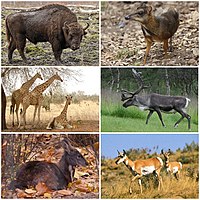
Photo from wikipedia
This study was conducted to investigate the effects of traditional Chinese medicine compounds (TCMC) on rumen fermentation, methane emission and populations of ruminal microbes using an in vitro gas production… Click to show full abstract
This study was conducted to investigate the effects of traditional Chinese medicine compounds (TCMC) on rumen fermentation, methane emission and populations of ruminal microbes using an in vitro gas production technique. Cablin patchouli herb (CPH), Atractylodes rhizome (AR), Amur Cork-tree (AC) and Cypsum were mixed with the weight ratios of 1:1:1:0.5 and 1:1:1:1 to make up TCMC1 and TCMC2, respectively. Both TCMC were added at level of 25 g/kg of substrate dry matter. In vitro gas production was recorded and methane concentration was determined at 12 and 24 h of incubation. After 24 h, the incubation was terminated and the inoculants were measured for pH, ammonia nitrogen, volatile fatty acids (VFA). Total deoxyribonucleic acid of ruminal microbes was extracted from the inocula, and populations were determined by a real-time quantitative polymerase chain reaction. Populations of total rumen methanogens, protozoa, total fungi, Ruminococcus albus, Fibrobacter succinogenes and Ruminococcus flavefaciens were expressed as a proportion of total rumen bacterial 16S ribosomal deoxyribonucleic acid. Compared with the control, the 2 TCMC decreased (P ≤ 0.05) total VFA concentration, acetate molar proportion, acetate to propionate ratio, gas and methane productions at 12 and 24 h, hydrogen (H) produced and consumed, and methanogens and total fungi populations, while the 2 TCMC increased (P ≤ 0.05) propionate molar proportion. Traditional Chinese medicine compound 1 also decreased (P ≤ 0.05) R. flavefaciens population. From the present study, it is inferred that there is an effect of the TCMC in suppressing methanogenesis, probably mediated via indirect mode by channeling H2 utilized for methanogenesis to synthesis of propionate and direct action against the rumen microbes involved in methane formation. In addition, the relative methane reduction potential (RMRP) of TCMC2 was superior to that of TCMC1.
Journal Title: Animal Nutrition
Year Published: 2019
Link to full text (if available)
Share on Social Media: Sign Up to like & get
recommendations!